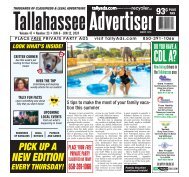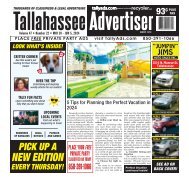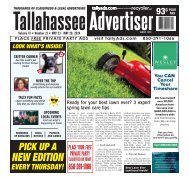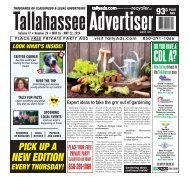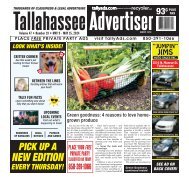The Trucker 060120
You also want an ePaper? Increase the reach of your titles
YUMPU automatically turns print PDFs into web optimized ePapers that Google loves.
THETRUCKER.COM<br />
b HOS from page 1 b<br />
driving for up to two additional hours to reach<br />
their destination or to a place of safety. Those extra<br />
two hours, however, had to be driven within<br />
the 14-hour window. Since the 14-hour window<br />
wasn’t extended, drivers often couldn’t take advantage<br />
of the extra driving hours. Under the revised<br />
rules, the 14-hour period is extended, up to<br />
16 hours, if the two additional hours of driving<br />
are needed.<br />
Finally, the short-haul exemption, excusing<br />
drivers from logging (ELD or paper) if they return<br />
to their home terminal and don’t exceed the<br />
area of a 100-air-mile radius, has been changed<br />
to extend the radius to 150 miles. Further, the<br />
12-hour work period is extended to 14 hours,<br />
matching short-haul drivers’ over-the-road counterparts.<br />
This exemption may benefit drivers who<br />
have local routes and are home each night.<br />
Any or all of the proposed revisions could be<br />
held up or eliminated if legal action threatened<br />
by safety-advocacy groups actually takes place.<br />
<strong>The</strong> 232-page FMCSA release of the final<br />
rule contains the statement, “<strong>The</strong> flexibilities in<br />
this final rule are intended to allow drivers to<br />
shift their drive and work time to mitigate the<br />
impacts of certain variables (e.g., weather, traffic,<br />
detention times, etc.) and to take breaks without<br />
penalty when they need to rest.”<br />
<strong>The</strong> announced changes were welcome news<br />
to drivers and organizations that had long fought<br />
for the revisions. <strong>The</strong> Owner-Operator Independent<br />
Drivers Association (OOIDA) submitted a<br />
request to amend the HOS rules in February 2018.<br />
<strong>The</strong> OOIDA request included expanding the<br />
shorter period of the rest break to three hours without<br />
counting the time against the 14-hour clock.<br />
<strong>The</strong> OOIDA request asked for elimination of the<br />
30-minute rest break, which was not granted. Instead,<br />
the parameters of the break were changed to<br />
lessen the impact to the driver’s schedule.<br />
Other petitioners for the rules changes Included<br />
<strong>Trucker</strong>Nation, the United States Transportation<br />
Alliance (USTA) and the United Drivers<br />
Association (UDA). <strong>The</strong>se organizations and<br />
others submitted favorable comments during the<br />
prescribed comment period.<br />
Also submitting comments, but opposed<br />
to the revisions, were the National Transportation<br />
Safety Board (NTSB), the National Safety<br />
Council (NSC), the American Academy of Sleep<br />
Medicine (AASM), Advocates, RoadSafe America,<br />
U.S. Sen. Patty Murray (D-Wash.), Rep.<br />
Peter DeFazio (D-Ore.), the International Brotherhood<br />
of Teamsters (IBT) and the Truck Safety<br />
Coalition (TSC).<br />
Reaction to the announced rule changes, as<br />
expected, has been mixed.<br />
Chris Spear, CEO of American Trucking Associations<br />
(ATA), said, “[<strong>The</strong> new] rule is the result<br />
of a two-year, data-driven process, and it will<br />
result in needed flexibility for America’s professional<br />
truck drivers while maintaining the safety<br />
of our roads.”<br />
Truckload Carriers Association (TCA) issued<br />
a press release that included the statement, “TCA<br />
applauds the (FMCSA) for taking an active role<br />
in receiving input from all stakeholders to craft<br />
flexible regulations for the industry while still<br />
improving safety, and for also expediting this<br />
rule change to provide the maximum benefit.”<br />
<strong>The</strong> general president of the Teamsters Union<br />
(IBT), James Hoffa, wasn’t celebrating.<br />
“In an effort to increase so-called ‘flexibility’<br />
for trucking companies, the FMCSA is abandoning<br />
safety and allowing drivers to push themselves<br />
to the limit even further,” Hoffa said in a<br />
press release.<br />
OOIDA, which began this round of HOS revision<br />
with a request to amend, issued a statement<br />
that included this thought from Todd Spencer, the<br />
organization’s president: “<strong>The</strong> hours-of-service<br />
regulations for commercial truck drivers need to<br />
be updated to match the realities of freight movement<br />
and to truly improve highway safety.”<br />
Spencer noted that the FMCSA is “finally listening”<br />
and urged “real truckers” to participate<br />
in the rulemaking process, “so that the next incarnation<br />
of the hours-of-service regulations is<br />
not written by corporate trucking executives and<br />
anti-trucking groups that have no understanding<br />
of the realities of over-the-road trucking.”<br />
If social-media comments are any indication,<br />
a general mistrust of the FMCSA dampened enthusiasm<br />
for the new rules. One commenter, identified<br />
as G JA Segura said, “So they changed it<br />
from a choke chain to a tight dog collar.” Another,<br />
Chester Gault, wasn’t convinced. “That’s no real<br />
change” he posted. “Doesn’t do any good.” James<br />
Hart agreed. “Yeah, they made a change,” he said.<br />
“But it doesn’t help the driver at all.”<br />
Many of the social-media comments, a large<br />
percentage of them unprintable due to language,<br />
were critical of the FMCSA and of U.S. Secretary<br />
of Transportation Elaine Chao. Others<br />
expressed that action on freight rates was more<br />
important than HOS reform.<br />
Jeremy Johnson, founder and administrator<br />
of the 8,800-member <strong>The</strong> Disrespected <strong>Trucker</strong><br />
Facebook group, likes the changes but wishes<br />
they had gone further.<br />
“It does add a little bit of flexibility, but they<br />
can’t seem to get it through their heads that the<br />
14-hour clock isn’t a good idea,” Johnson said.<br />
About the new 7/3 break period split, he wondered<br />
why the agency had to dictate the length<br />
of rest periods. “It’s not all bad, but give us the<br />
option of how we want to split our day,” he said.<br />
Kevin Steichen, president and co-founder<br />
of the United States Transportation Alliance<br />
(USTA), thought it best to withhold judgment<br />
until fully reading the 232-page FMCSA release.<br />
“It’s a good start,” Steichen said. “It does allow<br />
for a little more flexibility in how drivers use<br />
their hours.” Steichen cautioned against driver<br />
negativity. “It’s a little early for anyone to be<br />
picking it apart. Knee-jerk reactions don’t get us<br />
anywhere,” he said.<br />
Steichen noted that no regulation will please<br />
everyone.<br />
“<strong>The</strong> problem is that with the HOS, there<br />
isn’t a ‘one size fits all,’” he said, pointing out the<br />
trucking diversity found just on the USTA board.<br />
“We’re all owner-operators,” he said, “but I’m<br />
pulling a livestock trailer, Ingrid (Brown, safety<br />
chair) is pulling refrigerated, Mike (Landis, CEO)<br />
pulls a tanker and Tim (Siedschlag, vice president)<br />
pulls heavy-haul. We’re all different.”<br />
As previously noted, the FMCSA’s “final”<br />
rule isn’t official until 120 days after being published<br />
in the Federal Register, which had not yet<br />
happened at the time of this writing. <strong>The</strong> 120-<br />
day period is to allow for training of enforcement<br />
agencies and updating of ELD equipment. Legal<br />
actions filed by the opponents of the changes<br />
could delay implementation further or result in<br />
further revisions.<br />
No matter how the revisions are received,<br />
one thing is for certain; Trucking regulations will<br />
continue to evolve along with the industry and<br />
the world it serves. 8<br />
Nation June 1-14, 2020 • 11<br />
New TA Express now open in Mount Vernon, Texas<br />
THE TRUCKER NEWS SERVICES<br />
MOUNT VERNON, Texas — TravelCenters<br />
of America has opened a new TA Express in<br />
Mount Vernon, Texas. Formerly Duke’s Travel<br />
Plaza, the newly branded TA Express is at 300<br />
SE Access Road, at exit 147 off Interstate 30.<br />
This new location expands the company’s total<br />
nationwide network of travel centers to 266.<br />
Services and amenities include:<br />
• 53 truck parking spaces.<br />
• Ample auto parking.<br />
• Diesel fueling with RFID and DEF at<br />
all lanes.<br />
• Gasoline fueling lanes.<br />
• Private showers.<br />
• Laundry room.<br />
• Drivers’ lounge.<br />
• Elaborate dog park.<br />
• Travel store.<br />
Dining options include the Cotton Belt BBQ,<br />
Taco Casa and an on-site deli with freshly prepared,<br />
made-to-go options. 8<br />
Courtesy: TravelCenters of America<br />
This new TravelCenters of America location<br />
expands the company’s total nationwide network<br />
of travel centers to 266.<br />
Seeking High Performing<br />
Professional Team Drivers<br />
Work Well.<br />
Live Well. Earn Well.<br />
Guaranteed.<br />
Guaranteed Weekly Wage Starting at $1540<br />
Home 100+ Days Per Year<br />
Award Winning Workplace<br />
Professional Work Environment<br />
Comprehensive Benefits Package<br />
Earn Two Days Off for Every Week OTR<br />
$5000 Team Orientation Pay<br />
9 Paid Holidays, 5 Personal Days, and Paid Vacation<br />
Military Service Valued<br />
APPLY ONLINE OR SPEAK TO<br />
A RECRUITER TODAY:<br />
800-442-4004<br />
Join a company that has received the<br />
top 20 Best Fleets to Drive For<br />
for the 6th year in a row.<br />
DRIVEBOYLE.COM



